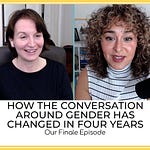Few people are aware of how much the political discussion around gender and sexuality has been touched by queer theory. This philosophy questions how we know what we know and turns hierarchies on their heads. Sasha and Stella explore the “smashing of binaries” in their therapeutic work and personal lives and discuss the positive and negative outcomes of taking queer theory thinking to its limits.
Links:
Butler, Judith (2007). Gender Trouble: Feminism and the Subversion of Identity. Routledge.
Jagose, Annamarie (1996). Queer Theory: An introduction (Reprint. ed.). New York: New York Univ. Press
Foucault, Michel (1978) [1976] The History of Sexuality: Volume 1: An Introduction. London: Allen Lane.
Foucault, Michel (1992) [1984]. The History of Sexuality: Volume 2: The Use of Pleasure. London: Penguin Books.
Foucault, Michel (1990) [1984]. The History of Sexuality Volume 3: The Care of the Self. London: Penguin Books.
Foucault, Michel (2021) [2021]. The History of Sexuality Volume 4: Confessions of the Flesh. London: Penguin Books
Extended Notes
Mother and father are no longer inclusive?
So much of our female oppression has been based upon our reproductive system.
Queer theory is a “slippery fish.” What is the definition of queer theory?
In any good democracy, there is a questioning of how we know what we know.
Ireland is objecting to all sorts of oppression. They know first-hand what it’s like.
How do you get through life if you have no idea what you know?
Stella’s daughter once asked: Who says being fat is unhealthy?
Queer theory will always be evolving.
If you can’t be a man, and if you can’t be a woman, then what are you?
Sasha shares some of her struggles as a woman and how she found her sexual orientation.
The development of a woman’s sexuality feels very understudied. People might scoff at this, but Stella explains further.
Not everything is due to a social construct.
Is gender a performance?
If there was a person by themselves on an island, would they really have a gender?
We are not walking gender identities, there is so much more to us.
You can’t use categories of behavior to try and assume someone’s sexuality or gender.
According to queer theory, gender is always political.
Do gender non-conforming children grow up to be gay or lesbian?
Queer theory believers say that you don’t need to have one drop of hormones to be classified as a valid man or woman. This adds complications to our society.
We shouldn’t sexualize children, but queer theory says, “Well, why not?”
Stella shares an example of how our literature is being “queered,” and why this is dangerous.
As a child, Stella used to walk past a graffitied wall that said, “Everything you know is wrong.”
We can’t just be “clever” for pushing boundaries, we also need to be wise.
How has queer theory impacted mental illness?
Why do we have to pretend that having a difference in our limbs is not unusual?
This podcast is partially sponsored by ReIME, Rethink Identity Medicine Ethics:
Learn more about our show: Linktr.ee/WiderLensPod











